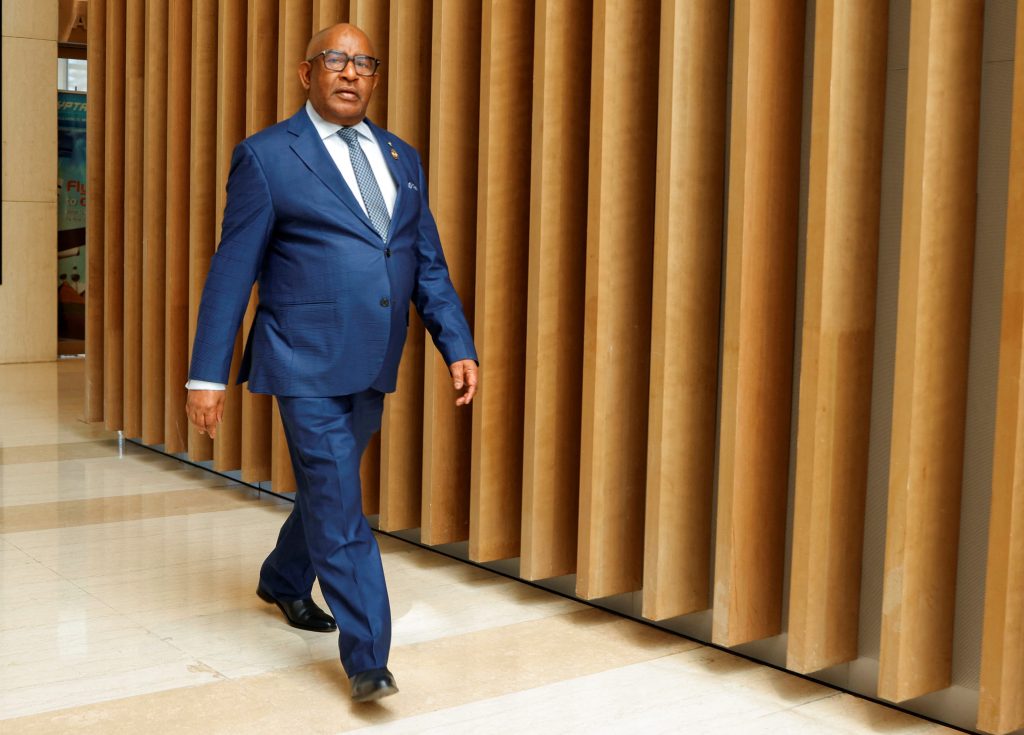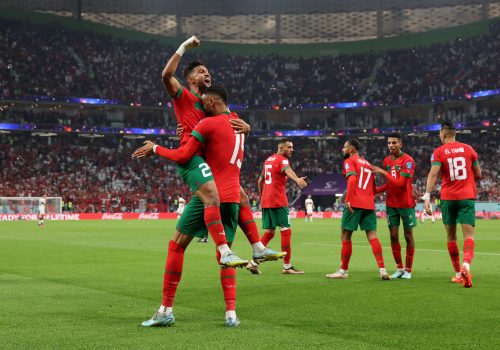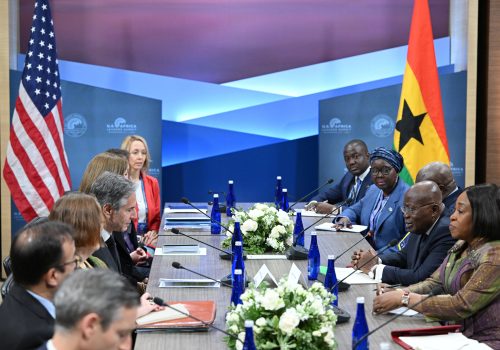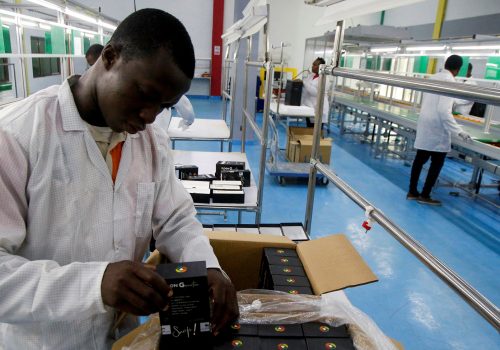Last week, the thirty-sixth Africa Union (AU) summit marked a fresh beginning with a new chair, Comoros President Azali Assoumani, who will face several challenges as the bloc seeks to chart a new course for Africa at a time when the political scene could see a significant shift. According to the electoral calendar, six presidential elections will take place in 2023, with Nigeria in February, Sierra Leone in June, Liberia in October, Madagascar in November, the Democratic Republic of Congo in December, and Gabon also in the second half of the year. Libya’s unsettled political situation means the country could not organize its elections initially scheduled for December 2021, and it is unclear whether elections will be held this year—as protesters and many in civil society have demanded. In South Sudan, elections planned for February 2023 have been postponed again.
Yet this is also a moment of rare opportunity for the AU. It is expected to play a crucial role in the new geopolitical order. This new role will require responsibilities and a vision. How the Union responds could shape the future of the AU and whether it emerges as a continental actor on par with other international blocs.
Like the outgoing AU chair (Senegalese President Macky Sall), the new chair will be confronted with many short-term hotspots from Bamako to Addis Ababa. Sudan remains suspended from the AU. Meanwhile, Mali, Guinea, and Burkina-Faso remain suspended from both the AU and the Economic Community of West African States (ECOWAS). These three West African countries will have to manage tough political transitions after experiencing coups—especially as they all sit in a region where jihadist movements continue to destabilize large areas of the Sahel. Months after the signing of ceasefire agreements between the federal government and rebels in Tigray, Ethiopia still needs to progress toward peace. Nongovernmental organizations continue to face difficulties accessing and distributing food and medical supplies in Tigray. War-crimes investigations remain difficult. The withdrawal of Eritrean troops is happening slowly. And over in the African Great Lakes, Rwanda and the Democratic Republic of the Congo (DRC) are clashing around the M23 rebel group’s role in the region as presidential elections in the DRC quickly approach.
In addition, Assoumani will also need to help the continent manage pressing challenges such as food security, climate change, energy access, and global-governance reforms—and the implementation of the free trade area. The management of these challenges depends on regional and worldwide cooperation with global powers.
Comoros will also be the AU’s primary point of contact for the follow-up and implementation of multiple commitments emerging from a slate of summits over the past two years, including the US-Africa Leaders Summit, the China-Africa Summit, the Europe-Africa Summit, the Tokyo International Conference on African Development, the Confederation of Indian Industry-Exim Bank Conclave, and, soon, the Russia-Africa Summit. At the summits that have taken place, participants have pledged billions in investments for Africa and support for African seats in various international bodies, including the Group of Twenty (G20) and the United Nations (UN) Security Council.
Individual nations cannot or should not solely address many of the challenges that lie ahead. In addressing issues such as supply shortages due to the war in Ukraine, representation at the next UN climate conference, access to finance, or Bretton Woods Institutions reforms, African nations must speak as a team to secure the best outcomes for all of them. That also applies to Africa’s relationship with the United States; the continent will need to collectively voice its priorities in regard to Washington’s plans for digitalization, trade (with the forthcoming expiration of the African Growth and Opportunity Act), and more. The AU must draw on its collective agency to harmonize national positions and face these continent-wide issues together. This will require strong leadership from the new chair.
Being a group of four islands with less than one million inhabitants, Comoros may seem a minor player in comparison to the African powerhouses that typically chair the AU, with the Union representing a continent of 1.3 billion people. The country has the opportunity to make its mark and turn its apparent weakness into a strength: African island diplomacy can be vital for advancing the continent’s defense and climate priorities. The United States recently launched an Indo-Pacific Strategy, and the Indian Ocean Commission, of which Comoros is a member, could serve a strategic role—especially as the West becomes increasingly concerned about the region, most recently because of ongoing joint naval exercises between China, Russia, and South Africa near Durban. An island strategy could have an impact beyond Africa, benefitting all small-island developing states. Comoros could advocate for alleviating island states’ financial problems—since 2008, the external debt stocks of small-island developing states have more than doubled. And, islands feel the brunt of climate change, as President of Seychelles Waval Ramkalawan explained at the Atlantic Council in December; Comoros has the opportunity to use its leadership in the AU to advocate for addressing the continent’s climate challenges.
Africa is at a crossroads. The African Union needs to be strong inside to be strong outside. It cannot request global governance reforms without exploring its own organization, identity, role, and means.
The African identity
The Union’s identity inevitably depends on the question of what it means to be African. Europe’s experience with understanding its own identity holds lessons. For example, Europe has wrestled with whether Russia and Turkey should be included. In the same vein, where does Africa begin and end? What does it mean to be African?
Some Africans even deny this word any legitimacy, preferring the terms “Kemit” or “Katiopa,” as they claim their ancestors would never have called themselves “African.” In Africa, people often refer to themselves first by the community to which they belong. In fact, most Africans know little about each other on the continent. Yet institutions are bringing African nations—or at least regions—together. For example, the African Cup of Nations, the continent’s premier soccer event, is as famous in North Africa as much as it is in Sub-Saharan Africa. And even though the Maghreb is sometimes lumped into the Middle East (as if being African means being black), Morocco is joining African institutions in an attempt to connect with other countries on the continent, having applied to join ECOWAS and having rejoined the African Union in January 2017 after thirty years of absence. After rejoining, Morocco’s king said “it is so good to be back home.”
Pan-Africanism
Africa, for all the diverse ideas around its identity today, has long had a pan-continental impulse. Inspired by the father of Ghana’s independence, Kwame Nkrumah, the Pan-Africanist movement has paved the way for the creation of the Organization of African Unity, the African Development Bank, the airline Air Afrique (which has since ceased operations), and a range of monetary, customs, and economic unions. Today, the African Union is twenty years old. Pan-Africanism created not only institutional change; it fueled an unprecedented cultural wave that inspired the first International Congress of African/Black Writers and Artists in Paris and Rome in the 1950s, the first World Festival of Negro Arts in Dakar in 1966, the Pan-African Festival of Algiers in 1969, the second World Festival of Negro and African Arts and Culture in Lagos in 1977, and similar seminal events.
Even though it is less vibrant today, the Pan-Africanist movement continues to inspire the African Renaissance. The African Continental Free Trade Area (AfCFTA), established in 2018 and launched in January 2021, is the latest illustration of this. As the largest free trade area in the world, it aims to establish a dynamic market, its consumers and customers already attracting the appetite of the global private sector. Beyond technical considerations such as tax harmonization, lowering customs tariffs, and the construction of viable infrastructure, the AU’s next mission will likely be to remedy the balkanization of the continent that unfolded in the 1950s and 1960s as colonial empires dissolved and the continent was broken up into countries. At the thirty-sixth AU summit, the next steps for the AfCFTA were a topic of debate.
Missed opportunities
Many of Nkrumah’s proposals never took off. Those include the idea of an African constitution and a continental parliament with two chambers, one of which would represent the population while the other would have all states, regardless of size or population, represented equally. Africa still doesn’t have a joint army (the African Standby Force is still on standby) or a universal passport (which has only been ratified by four countries). The Great Museum of Africa, planned by the AU, was initially supposed to open in 2016. Many of the AU’s continental institutions have no effect on the ground. Documents such as the African Charter on Human and Peoples’ Rights adopted in June 1981 or the Peace and Security Council Protocol adopted in July 2002 have not been implemented either.
Despite the very effective presidency of Paul Kagame, which improved the Union’s financial autonomy in 2016, the AU still needs the means for its economic sovereignty as it is still too dependent on foreign subsidies: In 2021, 65 percent of the AU’s 650-million-dollar budget was funded by international contributors. The African share, meanwhile, is concentrated in the hands of five countries. To finance the budget, the AU introduced in 2016 a 0.2 percent tax on all eligible goods imported into the continent. But only seventeen countries have actually implemented it as of June 2020. There is an urgent need to achieve budgetary sovereignty for the AU so that it can make its own choices freely. Otherwise, it will never be able to independently demand the seats Africans covet in the G20 or the UN Security Council.
The future
It is, above all, for the sake of its citizens that the African Union must raise its ambitions. The AU has a historical responsibility to foster a community of African nations coming together in a shared voice, as dreamed by Nkrumah and fellow Pan-African leaders.
Going forward, among numerous AU flagship projects, the new chairperson will need to lead two major and urgent initiatives—the accomplishment of them would impact a generation of Africans.
First, he’ll have to help craft an African vision for the climate and an African green bank, a necessary response to today’s climate challenges that will compensate for the shortcomings of the international community and unsuccessful UN climate convenings. Each year, the world incurs a fifty-five-billion-dollar debt to the African continent: This debt is the value of the carbon-absorbing service provided by the Congo Basin, the largest carbon sink in the world, covering six countries (Cameroon, the Central African Republic, the DRC, Equatorial Guinea, Gabon, and the Republic of the Congo). But Africans have never monetized it as a service. African countries should work together to raise the issue of the world’s debt to the African continent at the next UN climate conference.
Second, to limit the migration movements to Europe and strengthen people-to-people ties inside the continent, they’ll have to address free movement across the continent, which will require renewing the old physical infrastructure (roads and rail), building the Single African Air Transport Market, and fostering access to digital infrastructure through the reduction of data costs. This transition will require discussing an African passport on a continent where more than half the people have neither identity documents nor birth certificates. Creating such a passport would be a strong signal of unity. It is also critically important to negotiate the next steps of the Free Trade Area.
This is no small charge for the Union’s next leader. But anything less would do a disservice to 1.3 billion citizens who are ready to emerge on the world stage.
Rama Yade is the senior director of the Atlantic Council’s Africa Center and a senior fellow at the Europe Center. She is a professor at Sciences Po Paris and Mohammed 6 Polytechnic University in Morocco. She was a member of the French cabinet, serving as deputy minister for foreign affairs and human rights and ambassador to UNESCO.
Further reading
Wed, Feb 8, 2023
Pan-Africanism and soccer: How Africa can secure its next diplomatic win
AfricaSource By
African nations have an opportunity to collectively lobby for permanent representation in institutions including the UNSC.
Wed, Jan 18, 2023
Here’s how President Biden can build on the promise of his Africa summit
AfricaSource By Rama Yade
After an eight-year hiatus, the US-Africa Leaders’ Summit returned to Washington last month amid heightened global geopolitical tension and economic uncertainty. Why? Because Africa’s voice, economic potential, and geopolitical posture are more critical than ever. And the United States knows it. The United States has traditionally focused on security priorities in its African engagement. This […]
Tue, Dec 13, 2022
US-Africa Leaders Summit could make history—if leaders recalibrate trade relations
AfricaSource By
Africa has been squeezed into a limited role in global value chains. But leaders in Washington this week can rebalance the US-African trade relationship—and fulfill Africa's economic potential.
Image: Azali Assoumani President of the Union of Comoros and the incoming African Union Chairperson arrives for the 36th Ordinary Session of the Assembly of the Africa Union at the African Union Headquarters in Addis Ababa, Ethiopia February 19, 2023. REUTERS/Tiksa Negeri



